Should I choose a Heat Pump?
Ideal Heating and Cooling for Your Home
Boilers and Furnaces. Central air conditioning units. Oil and Propane. Window and Wall AC Units. Which do you have in your home and which HVAC system is the best for your home? These are all commonly found heating and cooling systems within the home. Homeowners oftentimes find that their heating and cooling costs are through the roof, this is especially true for new homeowners who haven’t seen how energy efficient their home truly is. Heat Pumps are an all-in-one solution for heating and cooling your home in an energy efficient manner. If you have been researching heating system upgrades or cooling system replacements, then you might already understand the benefits of the heat pump systems, below is more information about them.
Misconceptions of Heat Pumps
Heat pumps often face misconceptions that stem from limited understanding of their operation. One common misconception is that heat pumps are only suitable for warm climates. While it is true that heat pumps work efficiently in moderate to warm climates, advancements in technology have made them viable even in colder regions. Another prevalent misconception is that heat pumps only provide heating solutions but in actuality, heat pumps transfer heat from one place to another, meaning they can provide both heating and cooling. Additionally, some believe that heat pumps are not energy-efficient, yet modern heat pumps can significantly reduce energy costs compared to traditional heating systems. Some people experience higher than normal electric usage after the installation of a heat pump system but this is usually because the house might not be deemed “heat pump ready”. The heat pumps are not energy inefficient but instead the house itself is. If you have poor insulation and air sealing within your home, then the heat pumps cannot exhibit maximum efficiency as the air conditioned air isn’t being contained. Understanding the capabilities and benefits of heat pumps can dispel these misconceptions and showcase their value across various climates and home setups.
Benefits of Heat Pumps
Switching from natural gas, oil, propane, wood, or any other heating solutions to heat pumps offers a myriad of benefits for both residential and commercial properties. Heat pumps are energy-efficient systems that provide heating in the winter and cooling in the summer, making them a versatile year-round solution. By transitioning to heat pumps, property owners can significantly reduce their carbon footprint and reliance on fossil fuels, contributing to a more sustainable future. Additionally, heat pumps offer lower operating costs and require less maintenance compared to traditional heating and cooling systems, resulting in long-term savings for consumers. Embracing this change not only promotes environmental conservation but also enhances comfort and efficiency in indoor environments. One of the best combinations towards making your home carbon-neutral is the use of a heat pump system with solar panels. Make the switch to heat pumps today for a greener and more cost-effective heating and cooling solution.
Residential Heat Pump Assessment
If you are interested to embark on your journey towards a cleaner and more efficient home, then it starts with a free heat pump home energy assessment. At Energy Management Solutions, we provide comprehensive assessments for new heat pump installations to help our customers make informed decisions tailored to their specific needs. Our expert assessor will evaluate your property's layout, insulation, and heating requirements to recommend the most efficient heat pump system for optimal comfort and cost savings. The assessor will make sure that you are aware of any state and federal rebates or incentives that are available for your home such as NYS Clean Heat or Federal Tax Credits. We will be able to qualify and process these rebates for you and make sure you get the best price on your heat pump installation.
Types of Heat Pumps:
Air-Source Heat Pumps: These extract heat from the air outside to warm indoor spaces during cold weather and vice versa in the summer.
Ground-Source Heat Pumps (Geothermal): These harness heat from the ground for heating and cooling, offering higher efficiency but requiring more installation costs.
Ductless Mini-Split Heat Pumps: Ideal for homes without ductwork, these systems deliver air directly into different zones for personalized comfort.
At EMS we offer both Air-Source and Ductless Mini-Split systems. At the time of this post, we do not offer Ground-Source Heat Pump Systems.
Considerations for Heat Pump Installation:
Sizing: Proper sizing is crucial for efficient operation and optimal comfort.
Location: The outdoor unit should be placed where it has good airflow and minimal obstructions.
Insulation: Well-insulated homes maximize the efficiency of heat pumps.
Maintenance: Regular maintenance, such as filter cleaning and coil inspection, is necessary to ensure peak performance.
Regardless on whether or not you are looking to fully decommission your old HVAC Systems or just add onto your existing systems, then you might benefit from a Heat Pump. Click here to learn about the Clean Heat Program, or click here to schedule an assessment. For further questions, click here.
YouTube NYSERDA Heat Pumps
Better Comfort with Heat Pumps
NYSERDA Clean Heat
Con Edison Clean Heat
Mini-Split Systems
Benefits of Heat Pumps

